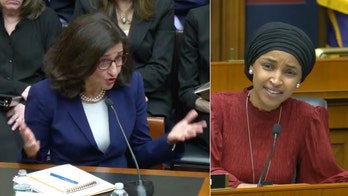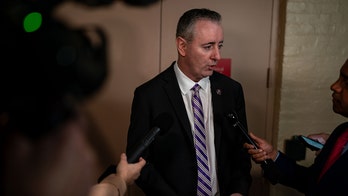Veep Vetting Begins
Chris Stirewalt and Bob Cusack discuss the veep vetting process the Romney camp is going through right now.
“I hope that our campaigns can respectively be about the future and about issues and about a vision for America. I’ve been disappointed in the president’s campaign to date, which is focused on character assassination.”
-- Presumptive Republican presidential nominee Mitt Romney when asked by reporters about a rejected proposal to a billionaire political activist to run an ad campaign reminding voters of the decades President Obama spent in the Chicago congregation of Rev. Jeremiah Wright.
The two most important questions in any presidential re-election bid are these: Do we want to keep the guy we’ve got and is the alternative acceptable?
Americans pretty clearly would like something different than what they’ve got. The president has been on the wrong side of the electorate since 2009 when he began the push for his health law, and the sputtery economy has reinforced the main doubt about Obama in 2008: that he wasn’t up to the job.
[pullquote]
Moderate voters concluded that Obama was a steadier hand than Republican John McCain, who responded to the Panic of 2008 in baffling fashion – quasi-suspending his presidential campaign to deal with the collapse of the financial sector only to go down to Washington and sign off on the same $700 billion bailout program backed by Obama and then-President George W. Bush.
But even as moderate suburbanites swung hard to Obama, they had reason to wonder whether the president with the thinnest resume in generations could really handle all of the crises impinging on the nation.
Obama passed the two biggest tests in the sense that the global depression many foresaw did not come to pass and that Islamist terrorists have not launched a successful, large-scale attack on U.S. soil.
If either of those things had happened, the acceptability of Obama’s alternative wouldn’t matter as much. In 1932, the Democrats could have run Al Smith or John Nance Garner and almost certainly have won. Hoover had to go, and any passably plausible candidate could have prevailed. Luckily for Democrats, that man happened to be Franklin Roosevelt, father of a three-generation majority for their party.
Obama’s problem is the strong suspicion among voters that someone with more experience and more knowledge of the economy could have avoided the pitfalls of the past 40 months. Liberals and conservatives disagree about the remedies, but on the big issues of the day; the economy, the health law, Afghanistan, debt , etc.; the status quo is deemed unacceptable. The best the president’s team can muster is to say that Obama staved off something much worse and, having trained on the job for four years, will do better next time.
Republicans say the credit for the end of the economic trauma of 2009 and the absence of a successful terror attack don’t belong to Obama, but for persuadable voters, results matter more than methods. Barring another panic or another terror attack, Obama won’t be Hoover. And that means Romney has a higher bar to surmount.
Of the nine incumbent presidents between Roosevelt and Obama who have run for another term, seven have succeeded. Voters generally don’t like to make a change unless they have to.
For several of the successful incumbents, they won on the first question: Do we want to keep the guy we’ve got. For Dwight Eisenhower, Richard Nixon, Ronald Reagan and Bill Clinton, the answer was ‘yes.’ No change was considered necessary and their opponents didn’t have much of a chance to make their case, not that their foes were very formidable opponents to begin with. (Lyndon Johnson got a thumbs up as the heir to the slain John Kennedy, so he’s a special case.)
Obama is in the company of the other five incumbents: Harry Truman, Gerald Ford, Jimmy Carter, George H.W. Bush and his son. The public is grouchy and certainly open to the idea of a change. Obama’s case is particularly difficult because he promised so much – cut the deficit in half, create 7 million jobs, hyper-transparency, ban lobbyists from his inner circle, etc. – and then failed to deliver.
Obama’s task is certainly as difficult as those of Truman, Ford and Carter. Obama has advantages they didn’t, but a look at how Americans feel about his governance and the direction of the country suggests Obama is right to warn his team of a rough 24 weeks to come.
In the case of Obama and the other five incumbents who failed the first question, the election hinges on the second part: is the alternative acceptable. Unfortunately for Obama, the verdict so far seems to be yes.
The best bit of news for Mitt Romney is that his Gallup favorability rating has just crested 50 percent, only 2 points behind the president. Better still, Romney’s negative rating is lower than Obama’s – 46 percent to 41 percent. Much of Romney’s 11-point rise since February can be attributed to the end of the bruising Republican primary process. Not only have Republicans coalesced, but the daily news cycle is no longer dominated by reporters gleefully repeating the latest attacks from Rick Santorum and Newt Gingrich.
Moderates and independents are open to the idea of a Romney presidency. They may not find him as likable as Obama, but they find him acceptable. That’s why Romney’s first general election ad asks voters to imagine “Day One” of a Romney president: See, it’s not scary, it might even be kind of nice.
Obama, meantime is working overtime to make Romney unacceptable. Lots of attack ads and frothy, personal jabs by Vice President Joe Biden in the Ohio Valley. Obama still believes Biden is a good emissary to the blue-collar, white voters who distrust the president.
It’s also why Team Obama fanned the flames on the story of a billionaire political activist having considered a plan to run television ads mentioning Obama’s decades at the Chicago church of Jeremiah Wright. The billionaire didn’t do it, but somebody slipped a copy of the proposal to the New York Times. What would have been a page-16 thumb-sucker about a Republican if it had made the paper at all was turned into a crucible for discussing crypto-racism in the GOP.
But Obama can count on the establishment press helping him with his preferred narrative for the election: that Romney is cruel and extreme. A “vampire,” even. When a sitting president is comparing his opponent to Nosferatu in a TV commercial before Memorial Day, it is not the act of a man confident in his re-election chances.
Obama knows his predicament and that the only way to survive will be if Americans conclude that Romney is not a good risk. Only two incumbents who were on the wrong side of the change question with voters – Harry Truman and George W. Bush – won. And in both cases it was because voters couldn’t bear the thought of electing their opponent. Voters may have been unsatisfied, but Tom Dewey and John Kerry looked like much worse options.
As you watch the election, keep a close eye on Romney’s favorable rating and the “right track/wrong track” question. The higher the gap between those numbers, the better for Romney.
The current Real Clear Politics Average for “right track” is 33.2 percent. Romney’s favorability average is 39.9 percent. But Gallup and other pollsters show that Romney is making fast gains on favorability. If the spread is anywhere above 15 points, Obama’s in big trouble.
That’s why you’ve heard Democrats this week accuse Romney of race-baiting and vampirism. With “right-track” consistently low, the best bet is to close the gap by driving Romney’s positives down. If Romney, like Ronald Reagan and Bill Clinton, is considered an acceptable alternative it will be tough for Obama to make his case.
And Now, A Word From Charles
“It's going to be one of the filthiest campaigns in American history. If you're Obama, what are you going to run on? He doesn't even mention Obamacare or the stimulus in any of his speeches. Is he going to run on the state of the economy? And his people have said the idea is to kill Romney. I gave a piece of advice the other day which was as the campaign begins every citizen ought to hide their children and make sure that the plumbing is right because he's going to have to shower at least twice a day. It's going to be an awful campaign.”
-- Charles Krauthammer on “Special Report with Bret Baier.”
Chris Stirewalt is digital politics editor for Fox News, and his POWER PLAY column appears Monday-Friday on FoxNews.com.





